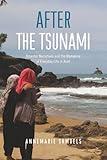After the Tsunami : Disaster Narratives and the Remaking of Everyday Life in Aceh / Annemarie Samuels.
Material type: TextPublisher: Honolulu : University of Hawaii Press, [2019]Copyright date: ©2019Description: 1 online resource (214 p.) : 5 b&w illustrations, 1 mapContent type:
TextPublisher: Honolulu : University of Hawaii Press, [2019]Copyright date: ©2019Description: 1 online resource (214 p.) : 5 b&w illustrations, 1 mapContent type: - 9780824878269
- 9780824880217
- 363.34/9480959811 23
- HV603 2004 .S26 2019eb
- online - DeGruyter
- Issued also in print.
| Item type | Current library | Call number | URL | Status | Notes | Barcode | |
|---|---|---|---|---|---|---|---|
 eBook
eBook
|
Biblioteca "Angelicum" Pont. Univ. S.Tommaso d'Aquino Nuvola online | online - DeGruyter (Browse shelf(Opens below)) | Online access | Not for loan (Accesso limitato) | Accesso per gli utenti autorizzati / Access for authorized users | (dgr)9780824880217 |
Frontmatter -- Contents -- Acknowledgments -- Map of Aceh -- Introduction: Remaking Everyday Life -- Chapter 1: Starting from Zero: Reconstruction, Reciprocity, and Recognition -- Chapter 2: Ruptures, Hauntings, and Embodied Narratives -- Chapter 3: Islam, Gender, and the Ethics of Grieving -- Chapter 4: Memory in Urban Space: Objects, Places, and Absences -- Chapter 5: Improvement Momentum: Imaginations of the Post-tsunami Future -- Conclusion: Narrative, Subjectivity, and the Post-Disaster Everyday -- Notes -- References -- Index
restricted access online access with authorization star
http://purl.org/coar/access_right/c_16ec
The 2004 Indian Ocean tsunami caused immense destruction and over 170,000 deaths in the Indonesian province of Aceh. The disaster spurred large-scale social and political changes in Aceh, including the intensified implementation of shari'a law and an end to the long separatist conflict. After the Tsunami explores Acehnese survivors' experiences of the deadly waves and the subsequent reconstruction process through the stories they tell about the disaster. Narratives, author Annemarie Samuels argues, are both a window onto the process of remaking everyday life and an essential component of it. Building on long-term ethnographic fieldwork, Samuels shows how the everyday work of recovery is indispensable for any large-scale reconstruction effort to succeed. Recovery is an ambiguous process in which grief remains as life goes on, where optimism and disappointment, remembering and forgetting, structural poverty and the rhetoric of success are often intertwined in individual and social worlds. Such paradoxes are key and form a thread through the five chapters of the book. Addressing post-disaster reconstruction from the survivors' perspectives opens up space for criticism of post-disaster governance without reducing the discussion of recovery to top-down interventions. Individual histories, emotions, creativity, and ways of being in the world, the author argues, inform the remaking of worlds as much as social, political, and cultural transformations do. After the Tsunami is a provocative and highly significant contribution to studies of humanitarian aid and disaster, psychological anthropology, narrative studies, and scholarly studies of Indonesia and Southeast Asia. Its elegant style, pointed theorizing, and moving ethnographic descriptions will draw readers into Acehnese lifeworlds and politics. Its narratives attest to Acehnese ways of living with loss, within and across a history of colonial and postcolonial violence and suffering and a present of political uncertainty and hope.
Issued also in print.
Mode of access: Internet via World Wide Web.
In English.
Description based on online resource; title from PDF title page (publisher's Web site, viewed 02. Mrz 2022)


